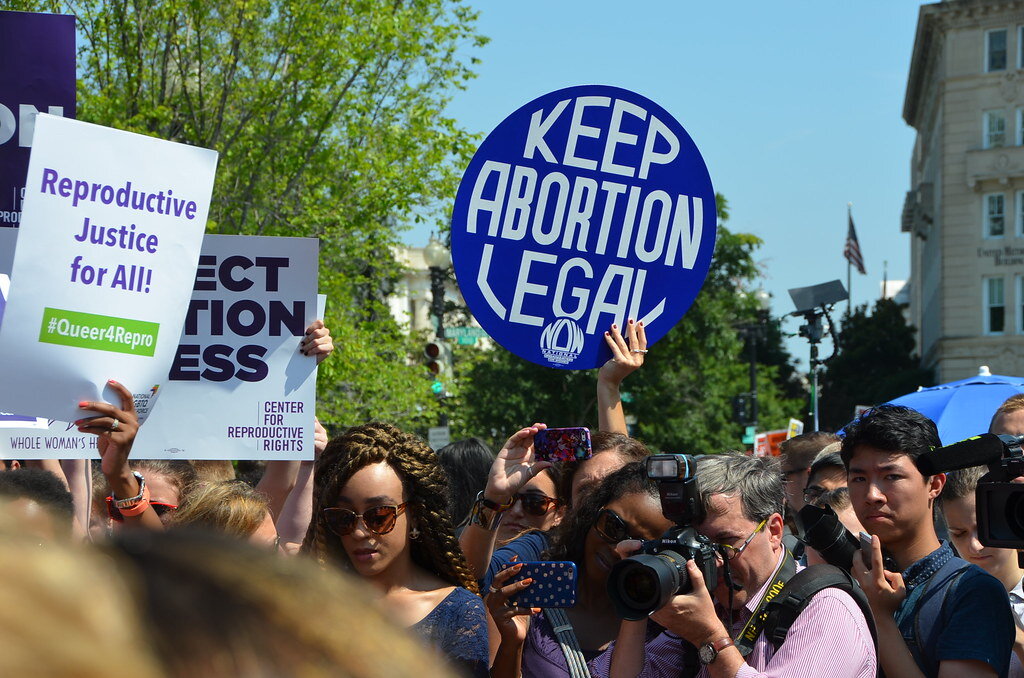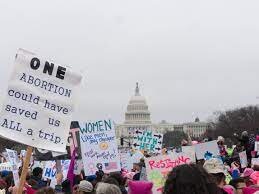Protesters gather in Washington, DC after the decision on Whole Woman's Health v. Hellerstedt Texas abortion case in 2017. Courtesy of Flickr
By Emily Tarinelli ’25
Staff Writer
On Sept. 20, over 500 current and former athletes and coaches submitted an amicus brief to the U.S. Supreme Court. These amici, described as "current and former athletes who are, or were at some point, able to become pregnant — regardless of gender identity" urged the protection of abortion rights for the first time in history.
According to WBUR, the brief was filed in light of Mississippi’s recent efforts to overturn a ruling by the 5th U.S. Circuit Court of Appeals that blocked the state from imposing an abortion ban after 15 weeks of pregnancy. The ban was in conflict with Roe v. Wade, the landmark decision that ensured people the right to an abortion . On Dec. 1, 2021, the state will be heard by the Supreme Court in an attempt to overturn Roe v. Wade.
The brief documented by the Supreme Court of the United States, which contains the signatures of Olympians as well as professional, intercollegiate and high school athletes, is endorsed by the Women’s National Basketball Players Association, the National Women’s Soccer League Players Association and Athletes for Impact. Noted signatories include two-time soccer World Cup Champion Megan Rapinoe, WNBA All-Star Layshia Clarendon and two-time Olympic swimming gold medalist Crissy Perham.
In a statement cited by BuzzFeed News, Rapinoe said, “As women athletes and people in sports, we must have the power to make important decisions about our own bodies and exert control over our reproductive lives.”
“Physically, we push ourselves to the absolute limit, so to have forces within this country trying to deny us control over our own bodies is infuriating and un-American and will be met with fierce resistance,” Rapinoe added.
Protest gather in favor of keeping Roe v. Wade. Courtesy of Wikimedia Commons
The brief expressed that “athletes must be guaranteed bodily integrity and decisional autonomy in order to fully and equally participate in sports,” noting that athletes would not be where they are today without abortion care.
“All athletes — men and women — have a narrow window of time to achieve their greatest athletic potential. This reality is magnified for women athletes for whom childbearing age coincides with their competitive peak in athletics,” the brief continued.
Perham echoed this sentiment in a WBUR report, emphasizing the importance of personal choice when it comes to reproductive rights.
“If [athletes] want to … continue their sport, they have that option. But if they don’t, they got to compete in the prime of their life — just like the men do,” she stated.
Perham spoke from her own experience in making the decision to have an abortion.
As an engaged student who had struggled through her first two years at the University of Arizona, she realized she was pregnant at 19 years old. According to WBUR, she explained that despite her hopes to have a family with her fiance, she ultimately decided to terminate the pregnancy.
“I made the very personal decision to have an abortion, which empowered me to take control of my future,” Perham said. “Others may have made a different decision in that situation, but my decision ultimately allowed me to become an Olympian, a college graduate and a proud mother today.”
Recently, Texas passed a ban on abortions after six weeks of pregnancy. In response, athletes, activists and advocacy groups — including the Mount Holyoke College Planned Parenthood Generation Action organization — took to the streets on Oct. 2 in Northampton, Massachusetts to protest what is now one of the most restrictive abortion laws in the nation.
Kylee Miller ’24, a board member of the PPGA, expressed her appreciation of athlete involvement in the movement for reproductive rights.
“It is important for athletes, especially in college and high school, to be vocal in support of reproductive health, rights and justice since they are cornerstones of [athletic] communities,” Miller said. “We really need as many people and communities to be working on the front of reproductive rights, especially with recent abortion bans across the country.”


